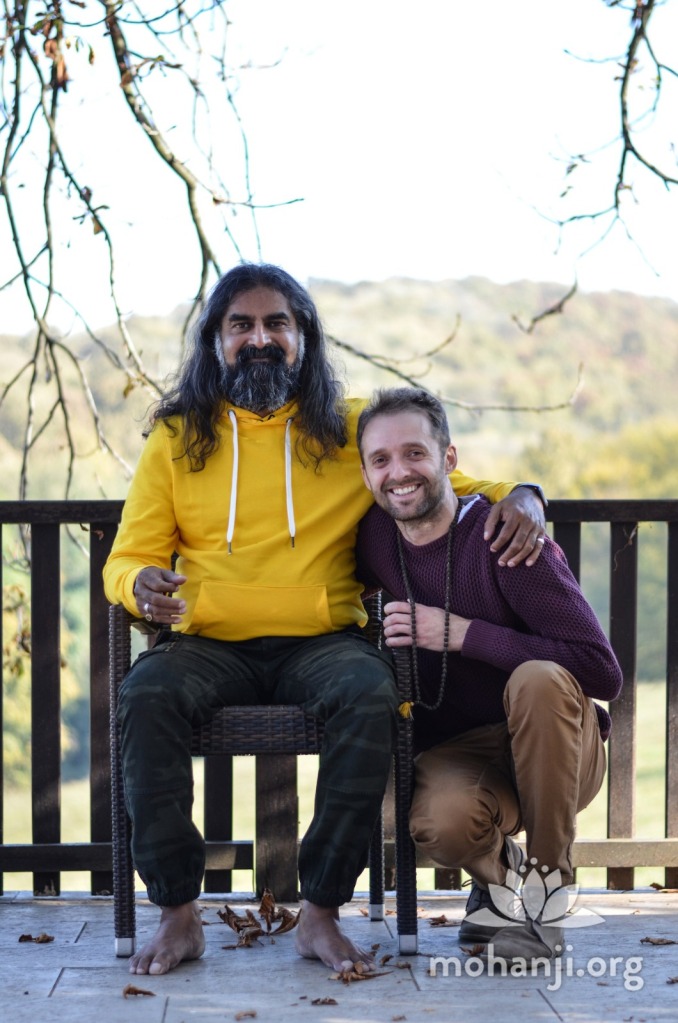Day 5 Lesson – Living consciously
by Christopher Greenwood
When I arrived at the house, I was received with a welcome as a guest. In the early days, I would often sit at the table for breakfast and lunch with Mohanji. Before anybody eats in the house, food is offered to the beings around the house – birds, squirrels, and even ants. One time during lunch, I noticed how clean Mohanji’s plate was – it was spotless. And I made a mindless comment about him having such a clean plate; I was not thinking.
This was when he told me about the karmic implications of wasting food. Even a grain of rice has an impact, as this has the potential to become a field of rice. He shared a story about this.
Whilst I thought I lived consciously, I realized that there is always more I can do, especially as I feel responsible for making this Earth better for the generations to come. Simple but powerful changes can begin at home.
—
Good morning, everybody. I hope you had a great day yesterday.
Today, one of the lessons which I’ve learned living with Mohanji is about living consciously. And this is living consciously with our own environment and the impact that we have on Earth. This is from an observation of Mohanji, and I feel it’s a really important awareness to have in our lives, as it’s about the consumption of what we have in the world, of the basics such as food and water.
In a previous recording, I shared that the majority of Mohanji’s teachings aren’t necessarily spoken, and you have to have a keen eye to observe. And they can be incredibly profound. And I’ve also heard somebody say that if you don’t keep a close eye on Mohanji, he could easily slip away. Because he’s not overtly teaching here when we’re in the house – we’re not sitting down in a satsang and sharing. But everything he is doing can actually, potentially become a lesson if we have the eyes to see. And one of the overarching teachings which Mohanji shared to many is that everything we do here on Earth comes with a price. We have Earth, and we’re using it as a platform for our experience. So, what we think, what we say, what we do – it all has some cost. And he believes that we should be leaving it a better place than when we arrived.
So, when I first arrived at the house, there would be some days where I would have breakfast and lunch at the same time as Mohanji. At that time, I was a new guest, and I would join everyone at the food table. Everybody eats each meal together. Before we eat, all the fresh food cooked that day is first offered to all the beings around the house. So it’s placed out for all the birds that come – the crows, the various other Indian birds that I don’t know the name of. And then you have the squirrels come as well. They will then flick over the food on the ground, so the ants get to eat as well. So everyone’s fed before we eat. And the food is also offered to the deities.
And during this time, I observed Mohanji and how he was eating – he only took very little food and was very conscious. He didn’t load the plate – he took a small amount and then would add more, as and when he needed it. I also noticed that nothing gets wasted; it’s all eaten. So everything is gone – the plate is completely clean, even right down to the last grain of rice. I think I just made a thoughtless comment at that time about him having a clean plate. And this is when he told me that everything here has a price and that we should respect everything – all our materials. He said that wasting food actually comes with a karmic price because even a grain of rice (if you’re wasting that grain) had the potential to become a whole field of rice.
He then shared a story of a saint who was found in the gutters, near some grand wedding party. It was a grand event, a really big affair where hundreds of people were dancing, celebrations, and singing. As with many Indian weddings, there was plenty of food there, offered in a variety. When the people who were having food on their plates had enough, they would chuck the remaining food and the plates into the gutter. Normally the cows would come and eat that food. And he (the saint) was there, eating leftovers. When somebody saw him, they took pity on him because they thought he was a homeless man and he was hungry. They wanted to invite him to the wedding to come and eat some of the fresh food. But he actually said no. He said, “No, I need to do this. I’m helping them because they don’t know what they’re doing, throwing all this away.”
So that was the message for me there, and it was quite an impact. He also shared that if someone is serving food and the other person doesn’t eat, that burden goes to the person who served it. It had an impact on me; I instantly had a flashback to last Christmas, to my large family; I think there were maybe 20-25 of us; we had them around to mine and my brother’s house, and we cooked for them. I remembered all these plates coming back from all the kids, all half-full, and myself just chucking all the food into the bin. And I just had the realization that this is probably happening daily all over the world. Most of the time we’re not aware of what we’re doing – that’s overconsumption. And then people are probably overeating too – eating more than what they actually need, and it’s just coming out the other end, undigested. People glorify food; they glorify the amount they eat, the quantity, the size, and the variety of foods they have. And I then also thought that this is not just with food, it’s probably the same with water too.
With Mohanji, we are really conscious of the amount of water we use and everything else like electricity. Since I’m here, I’m using the Indian bucket system for showers and baths – which if you’re not aware of it, is that you fill up a bigger bucket with the water and then use a smaller one to wash. I appreciate that now because I’ve become aware of how much water I used to waste.
So this consciousness, just from that small observation, has completely shifted my awareness to be more conscious about what I’m using. And these are just the basics – food and water. I can apply that same thinking and logic to everything else that I consume here now. Also, to my personal products – how much am I using, why am I using it, where it comes from, where it’s made, and the impact of it. Technology, cars, washing machines, everything that we have, we’re taking things from the Earth all the time.
And for Mohanji, it even comes down to the extent where the other day, I noticed how conscious he is about the use of products and his impact as he’s walking on this Earth. For example, when we do satsangs, he has water and might use a tissue to wipe his mouth. When he had finished for the day, I wanted to throw it away, and he said, “What are you doing? I can still use that.” So even down to that level of keeping a tissue is the responsibility that he feels: We should take good care of everything that’s being used.
That’s the lesson for today, just from a small observation. I hope you enjoyed it. And maybe you can take that into your life. If everybody had this awareness around the world, it would probably be a very different place now. Thank you very much, and speak to you soon.
P.S. I asked Mohanji how we can reduce any karmic burden from food waste. He said by feeding the beings of the air, land, water, and human beings.
P.P.S. I’ve asked my brother to reduce the amount of food for Christmas this year because there’s always wastes.
|| JAI BRAHMARISHI MOHANJI||
Edited & Published by – Testimonials Team, 7th February 2021
Disclaimer:
The views, opinions, and positions expressed by the authors and those providing comments on these blogs are theirs alone and do not necessarily reflect the views, opinions or positions of Mohanji, Mohanji Foundation, it’s members, employees or any other individual or entity associated with Mohanji or Mohanji Foundation. We make no representations as to accuracy, completeness, timeliness, suitability or validity of any information presented by individual authors and/or commenters on our blogs and will not be liable for any errors, omissions, or delays in this information or any losses, injuries or damages arising from its display or use.
We reserve the right to delete, edit, or alter in any manner we see fit blog entries or comments that we, in our sole discretion, deem to be obscene, offensive, defamatory, threatening, in violation of trademark, copyright or other laws, of an express commercial nature, or otherwise unacceptable.
— Mohanji Testimonials Team


